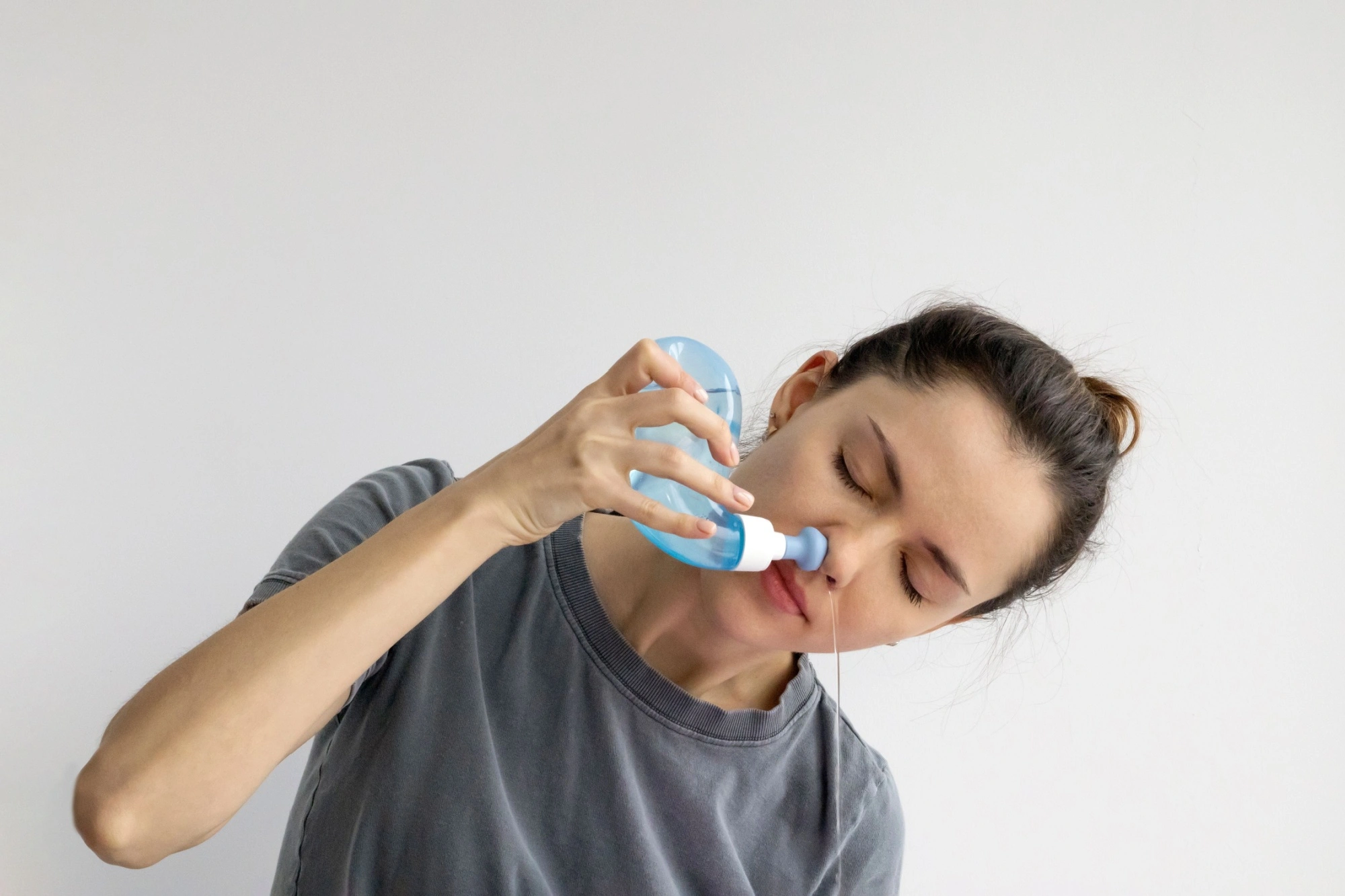Sinus Infections
Does Nasal Irrigation Help Sinus Infections?
August 9, 2024
•
5 minutes
Reviewed by Michael Kaplan, MD

If you’re suffering from a sinus infection, you know just how miserable it can be. The congestion, pressure, and pain can make you desperate for relief. If you’ve spent any amount of time searching for the best medicine for sinus drainage, you’ve likely come across recommendations for sinus rinses. But does nasal irrigation help sinus infections, truly?
The good news is that nasal irrigation can indeed help alleviate symptoms of sinus infections. In this blog post, we’ll explore the benefits of nasal irrigation, how to do it safely, and when to seek professional help for chronic sinus issues.
Should you flush your sinuses if you have an infection?
Generally, yes. Nasal irrigation can be an easy way to find sinus pain relief. By clearing out the nasal passages, sinusitis nasal washing can reduce inflammation, improve sinus drainage, and even help distribute medication more effectively if you’re using nasal sprays. The process works by physically removing excess mucus and debris that can harbor bacteria and viruses, supporting your body’s natural healing processes.
However, you should approach nasal irrigation with caution, especially during an active infection. Always use sterile, distilled, or previously boiled and cooled water to avoid introducing harmful microorganisms into your nasal passages.
Follow proper techniques, using a clean irrigation device and tilting your head at the correct angle (we’ll go more into detail on how to rinse sinuses below). If you have a severe infection, a nosebleed, or completely blocked nasal passages, consult a healthcare professional before attempting irrigation.
What is the best nasal rinse for sinus infection?
A simple saline solution is often the best choice for nasal irrigation. You can make your own by mixing 1/4 teaspoon of salt and a pinch of baking soda in 8 ounces of warm distilled water. Alternatively, you can purchase pre-made saline solutions from your local pharmacy.
There are several different methods you can use to flush your sinuses with this solution including:
- Neti pots
- Squeeze bottles
- Bulb syringes
- Nasal sprays
- Electric pulsatile devices
While all these methods can be effective, neti pots stand out as the best and easiest option for most people. This is because they offer a gentle, easy-to-control flow, are comfortable to use, simple to clean, and are cost-effective.
How does a neti pot work?
A neti pot is a small, teapot-like container designed for nasal irrigation that has recently gained popularity as a natural remedy for sinus issues. While neti pots aren’t the only way to irrigate your sinus, they are the most commonly used tool.
Neti pots work by allowing you to pour saline solution into one nostril while tilting your head, letting the solution flow through your nasal passages and out the other nostril. This gentle flow helps flush out mucus, allergens, and irritants that can cause congestion or discomfort, and the saline solution moistens the nasal passages, reducing inflammation and promoting better sinus health.
While it may feel unusual at first, many users find that regular use of a neti pot provides significant relief from sinus-related symptoms and improves overall nasal function.
Continue reading: Does a neti pot help clogged ears?
How to rinse sinuses safely
If you’re experiencing sinus infection symptoms like brown mucus in your throat or strange smelling mucus in your nose, nasal irrigation may be able to offer you some relief, but it’s important to follow proper techniques to ensure safety and effectiveness.
Here’s how to rinse your sinuses safely:
- Prepare your saline solution using sterile water (distilled or boiled water will work).
- Heat the water to lukewarm temperature.
- Lean over a sink with your head tilted to one side.
- Gently pour or squeeze the solution into your upper nostril.
- Allow the solution to drain from your lower nostril.
- Repeat on the other side.
- Gently blow your nose to remove any remaining solution and mucus.
- Use nasal sprays immediately after. Freshly irrigated nasal passages allow for better absorption and distribution of medication.
Remember to breathe through your mouth during the process and to clean your irrigation device thoroughly after each use. If the solution is going down your throat instead of out the nostril, try to lean your head forward even more and tip your forehead down.
Improper use can potentially introduce bacteria or irritants into your sinuses, exacerbating your condition — additionally, rinsing your sinuses might not address the root cause of the sinus infection at all, causing your repeated sinus rinses to act as a bandaid for a condition that needs treatment.
Find lasting sinusitis relief at Kaplan Sinus Relief
Does nasal irrigation help sinus infections? Yes, but only to a degree. While nasal irrigation can provide significant relief for sinus infections, it’s important to remember that chronic sinus issues may require more advanced treatment.
If you’re experiencing recurring or severe sinus infections, it may be time to consider a more permanent solution. Balloon sinuplasty, offered by Kaplan Sinus Relief in Houston, is a minimally invasive procedure that can provide long-lasting relief from chronic sinusitis when at-home treatments such as sinusitis nasal washing don’t work.
You don’t have to let sinus problems control your life — schedule an appointment with Kaplan Sinus Relief today to explore your options for total sinus relief.
More Helpful Articles by Kaplan Sinus Relief:
- Should I Get a CT Scan of Sinuses?
- How Much Does Eustachian Tube Balloon Dilation Cost?
- The Different Types of Sinus Surgeries
- What is Balloon Nasal Dilation?
- What Can Nosebleeds Be a Sign Of?
